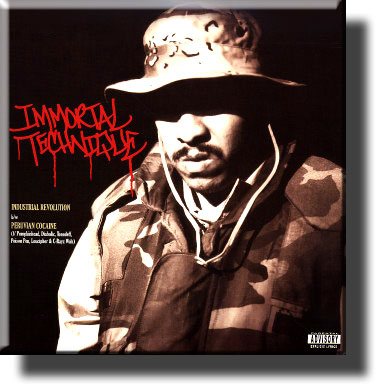FCNNEWSSOURCE

Web Posted August 8, 2006
He is Peruvian and his grandfather is Black. His lyrics are filled with awareness of the struggles of oppressed people all over the world. His name is Immortal Technique and he was recently in Chicago to perform in the Lyrics for Liberty II benefit concert, organized on the campus of DePaul University by Students for Justice in Palestine group to raise money for a children’s organization. He sat down with Final Call Online Correspondent Ashahed Muhammad for a broad discussion of current events, the global struggle for peace and justice, and the role of hip hop in that struggle.
Ashahed Muhammad (AM) : What is the root of your consciousness, your political education because of your obvious grasp of political affairs and the geo-political landscape in your music?

Immortal Technique (IT): I started when I was about nine years old. I could always write, spit a little freestyle here and there. It was something I really didn’t take seriously until I was locked up in 1998 and right then and there I started writing more and actually constructing songs.
When I got out of prison, I was on parole and I couldn’t get no regular job. So my solution was to find any side hustle I could get. On the side, I would do these emcee battles and I was successful. I won most of them in New York City. I realized that I wrote a lot of the songs based on that concept of revolution, whether it was global or happening in Harlem, to combat gentrification, or where I was hanging out in Washington Heights where it was just a drug game.
It just dawned on me that a lot of these songs are about these specific things in my hood and other hoods. So I called the album Revolutionary, Volume One and started hustling the street. Sold maybe 7,000 albums and then I started working on the next album. I was connected with a man who later became my financial advisor and then I became associated with Viper Records. I definitely learned a lot about the music industry. I choose to stay independent so that I can have the ability to say what I want to say.
AM: What are some of your upcoming projects?
IT: Green Lantern, that’s a mix tape that’s coming out. After that, I’m going to have a record that relates to what we are talking about. A new album called The Middle Passagebecause, as an underground emcee, I can say anything, I can do anything. I don’t need to clear this sample. I don’t need to clear this artist. You want to make a solo, let’s make a solo. We can do whatever we want to do. I don’t have to pay nobody else to make the music.
Once I become involved in the commercial mainstream, it’s like a transition between freedom and being a slave. And what was the Middle Passage? It was a transition between freedom and slavery, and it was perpetrated by people who understood. When you understand and you steal a lot of people, it gives you a devilish nature. To try to convince people that they’re lesser human beings in order to justify your rule means that there’s something inherently devilish about the way that you want to set up the world.
IT: Before I say that, it’s something for me to get involved with things because, at the end of the day, I have to make the final decisions about everything–from what songs go on my album to how the cover art looks. Every aspect of it, I have to have the final word. It doesn’t go if I don’t say yes. Therefore, it’s in my control and it’s my desire. If I lend my support to a specific cause, it has to be something that I look over and that I have a complete understanding of and it’s not just some extracurricular bull—-.
I see a lot of that in Black politicians and Brown politicians, too. It’s sad because these are the people that you never see when it comes time for us to come together or when it’s something that has to do with police brutality in our neighborhood; when it has to do with gentrification. It seems like they’re there for the photo-op, but they’re not there for anything else.
AM: You have a message in your music, you have a fan base and you’re bilingual. That’s dangerous to those who fear the spreading of a conscious, revolutionary message. Do you feel that?
IT: I kind of want to see how they’re going to do that.
AM: With the press and things like that?
IT: Not just press, but the best way to destroy a movement is to become part of it and corrupt it. Infiltrate it. If you don’t like the guerillas, you just start bombing civilians and you claim that it’s them. You start killing people and you claim that it’s them. If the government really finds revolutionary hip hop to be a real issue, they’ll just bankroll somebody who has a similar message to mine, but is much more in line with their politics. They’ll look more rational than me, by their standards, by conforming to America.
AM: As opposed to taking a conscious message and stripping it or redirecting it like they did in the ’90s?
IT: They can never fight it.
AM: That’s what they did when there were conscious rappers.
IT: They’ll accept the capitalists. The ‘king of hip hop’ is always the poster child for capitalism, no matter who it is. I’ve always focused on the way history repeats itself. In every movement, we’ve always been infiltrated and we’ve always had people telling on each other.
There’s a book by Herbert Aptheker called, “American Negro Slave Revolutions,” and it talks about all the slave revolutions, not just the ones that we’re told about, but it talks about maybe 5,000 other incursions. It talks about several dozen larger ones and how they all were betrayed by your house n—–s. They’re all betrayed by one person who is afraid of stepping outside of the status quo. It’s always your own people. The sad thing is we can look at our people and it makes some of us hate some of our people, but the truth is they’re being talked to in their ear by the system that promises them something better.
So whether it’s this message or whether it’s this one, it don’t matter for them. You’re stopping their paper; you’ve got to go. I’m not stopping their paper yet. I still make money for the distributor. If I find a way to press my own records and distribute my own record and I start a distributing company and a publishing company, then you’ll have my head on a wall somewhere.
AM: What’s next for you?
IT: One of my old friends has been working on a documentary about the inner workings of the business and kind of like my rise from an ex-con as somebody who couldn’t really get a job to someone who had to accept the personal responsibility of doing this. I just want to make myself a better man. There are a lot of things I know I have to change in my life and, in all honesty, it’s a process. It’s slow sometimes. I’m not perfect.
AM: What is the perfect world for Immortal Technique?
IT: The perfect world for me is to find some sort of inner peace. I believe that a man that walks with God can walk anywhere. Just because I choose to question religion doesn’t mean that I’m spitting in God’s face; it’s the opposite. I’m tired of people spitting in God’s face. I’m tired of seeing these divisions over a different type of Christianity, over a different type of Islam.
When you look at Sunni and Shiite, you see that their division comes from who would control the culture of Islam. That isn’t about the sanctity of the religion, that’s about who has the power. Are they related to the Prophet? If they weren’t related to him, there’s no way you would become related to him; you couldn’t become his son all of a sudden if you were already born.
The Catholic Church did the same thing with its succession of popes. It is disturbing that one of [Cardinal Ratzinger’s] primary functions was to destroy liberation theology in Latin America–an ideology that promoted that Jesus Christ was more on the side of poor people than he would be on the side of rich people; that was Cardinal Ratzinger’s position before he became pope. He was busy destroying those documents, destroying the idea that Jesus had more to do with the people; that he walked among than individuals that stole his image; that painted him White; that decided to use him to justify everything else.
I would love for [Jesus] to come back because I would love for him to face what is happening and to really have some sort of perspective. In that same respect, I’m sure that Prophet Muhammad would be disgusted by what some people use his name to justify.
AM: Thank you.
Find Immortal Tehnique’s tour dates and download tracks @
http://viperrecords.com/index.php/artists/immortal-technique












